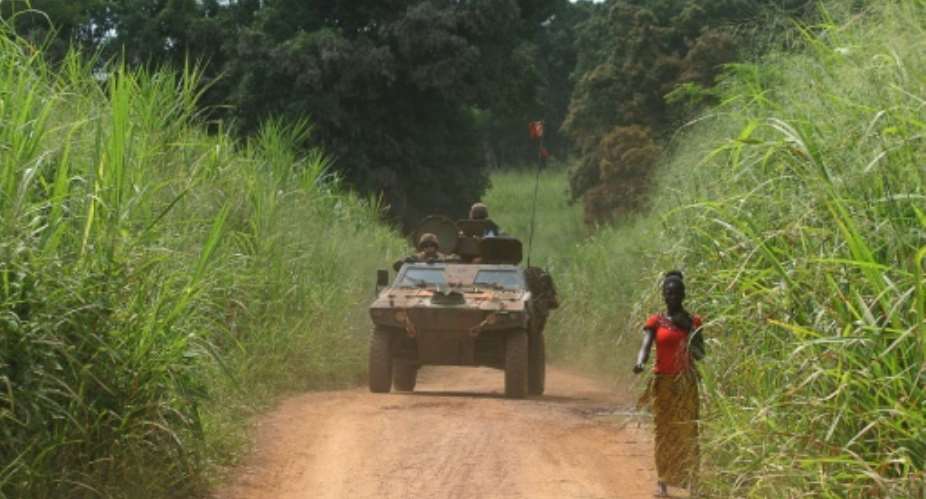Bangui (Central African Republic) (AFP) - With scores killed in fresh sectarian violence and militia fighters still refusing to disarm, Central African Republic is on a razor's edge weeks before a French troop pullout and a key donors' conference.
After more than two years of brutal slaughter between Christian and Muslim groups that displaced one out of 10 of the country's 4.5 million people, CAR had appeared to be returning to normal, holding peaceful elections early this year after a visit by the pope.
But despite 12,000 UN peacekeepers and a few hundred remaining French troops, tensions are high and tens of thousands of people are still displaced and in need of aid.
This week saw 30 killed and scores more hurt when fighters from a mainly-Muslim militia group attacked civilians and clashed with UN peacekeepers. The week before a dozen people died in the capital in fighting between Muslim forces and Christian vigilantes.
At the end of this month, French Defence Minister Jean-Yves Le Drian flies into the capital, Bangui, to wind up French military Operation Sangaris, launched in December 2013 amid fears of an imminent sectarian bloodbath.
After an earlier scale-back only 350 troops remain.
No effective army
CAR plunged into chaos after the March 2013 ousting of long-serving president Francois Bozize, a Christian, by the mainly Muslim Seleka rebel alliance -- triggering revenge attacks and a spiral of atrocities in which thousands were slaughtered.
But in February this year, Central Africans managed to calmly vote into office former university professor President Faustin-Archange Touadera.
 The UN mission has several times been criticised for not lifting a finger during clashes, while some of its soldiers have been accused of sexually abusing Central African civilians
The UN mission has several times been criticised for not lifting a finger during clashes, while some of its soldiers have been accused of sexually abusing Central African civilians
He took charge however of a state with little authority and no effective army.
Security is effectively overseen by the United Nations and constantly threatened by warlords whose armed bands are a legacy of decades of instability and who have been deaf to calls for DDRR (Disarmament, Demobilisation, Reintegration and Repatriation).
"Wherever there are armed groups, the authority of state is not complete," said Gaston Yendemo, chief administrator of the central Nana-Gribizi region where this week's clashes took place.
'Disproportionate response'
The violence in the central market town of Kaga Bandoro began when a member of the mainly Muslim ex-Seleka militia was killed as he and three others tried to steal a generator from a local radio station.
"There was a disproportionate response from ex-Seleka people, who attacked civilians including displaced people hiding in church premises," said a MINUSCA statement.
The fighters then attacked a camp for displaced people as well as NGO offices. UN troops from Burundi and Pakistan hit back to protect civilians, killing 12 of the assailants.
"Five thousand more displaced people from the bishop's quarters have taken refuge next to the MINUSCA base," the UN Office for the Coordination of Humanitarian Affairs announced later.
The UN mission has several times been criticised for not lifting a finger during clashes, while some of its soldiers have been accused of sexually abusing Central African civilians. A similar accusation hangs over a small number of French soldiers.
 UN Deputy Secretary General Herve Ladsous urged the world to stand by the Central African Republic at a donors' conference to be held in Brussels in November 2016
UN Deputy Secretary General Herve Ladsous urged the world to stand by the Central African Republic at a donors' conference to be held in Brussels in November 2016
Aid workers meanwhile, who are often targeted, are withdrawing making the situation worse for ordinary people.
"In Kaga Bandoro alone, the reduction of humanitarian activity has deprived at least 200,000 people of help. In the region, food insecurity affects 120,000 people and 73,206 people are still displaced," OCHA reports.
Floods, cholera and the occupation of schools by armed groups makes life even more difficult.
UN Deputy Secretary General Herve Ladsous earlier this month urged the world to stand by CAR at a donors' conference taking place in Brussels on November 17.





 April 20: Cedi sells at GHS13.63 to $1, GHS13.06 on BoG interbank
April 20: Cedi sells at GHS13.63 to $1, GHS13.06 on BoG interbank
 Dumsor: I'm very disappointed in you for messing up the energy sector — Kofi Asa...
Dumsor: I'm very disappointed in you for messing up the energy sector — Kofi Asa...
 Dumsor: Instruct ECG MD to issue timetable and fire him for lying — Kofi Asare t...
Dumsor: Instruct ECG MD to issue timetable and fire him for lying — Kofi Asare t...
 Ashanti region: Road Minister cuts sod for 24km Pakyi No.2 to Antoakrom road con...
Ashanti region: Road Minister cuts sod for 24km Pakyi No.2 to Antoakrom road con...
 Train crash: ‘How could any normal person leave a car on rail tracks?’ — Frankli...
Train crash: ‘How could any normal person leave a car on rail tracks?’ — Frankli...
 Train crash: Driver of abandoned vehicle not our branch chairman nor secretary —...
Train crash: Driver of abandoned vehicle not our branch chairman nor secretary —...
 Kenya pays military homage to army chief killed in copter crash
Kenya pays military homage to army chief killed in copter crash
 US agrees to pull troops from key drone host Niger: officials
US agrees to pull troops from key drone host Niger: officials
 Mahama vows to scrap teacher licensure exams, review Free SHS policy
Mahama vows to scrap teacher licensure exams, review Free SHS policy
 Government will replace burnt Madina shops with a new three-story, 120-store fac...
Government will replace burnt Madina shops with a new three-story, 120-store fac...
